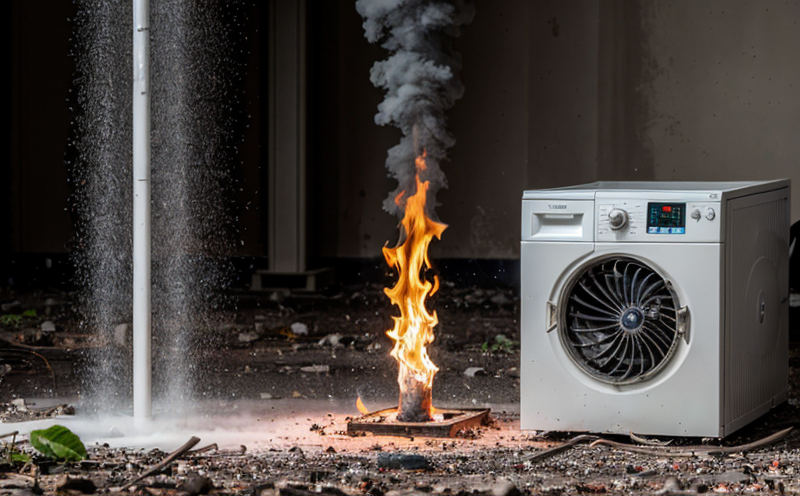IEC 62619 Environmental Stress Testing of Industrial Lithium-Ion Batteries
The IEC (International Electrotechnical Commission) standard IEC 62619:2015 provides a framework for testing the durability and reliability of industrial lithium-ion batteries under environmental stress conditions. This standard is particularly important in sectors where high performance, longevity, and safety are critical, such as automotive, aerospace, and telecommunications.
The purpose of this test is to simulate real-world operating environments that batteries may encounter during their lifecycle. It evaluates the battery's ability to withstand various stresses without degradation or failure. The standard covers a range of environmental factors including temperature cycling, humidity, vibration, and altitude variations. By subjecting industrial lithium-ion batteries to these conditions, manufacturers can ensure that their products meet stringent performance requirements.
The testing process involves carefully preparing the specimen according to IEC 62619 specifications. This includes charging the battery to a specified state of charge (SOC) and ensuring it is in good condition before placing it into the environmental chamber. The chamber then exposes the battery to controlled cycles of temperature, humidity, vibration, and other relevant stresses.
After undergoing these stress conditions, the battery undergoes rigorous performance testing. This includes measuring voltage stability, internal resistance, capacity retention, and overall electrical efficiency. If any parameter falls outside acceptable limits, it indicates that the battery may not meet the required standards for industrial use. Compliance with IEC 62619 ensures that batteries are robust enough to withstand harsh environments while maintaining high levels of performance.
The significance of this test lies in its ability to predict how well a lithium-ion battery will perform under real-world conditions. It helps manufacturers identify potential weaknesses early on, allowing for improvements before products reach the market. Additionally, compliance with IEC 62619 can help companies meet regulatory requirements and gain competitive advantages by demonstrating superior product quality.
For industries reliant on industrial lithium-ion batteries, ensuring these devices are reliable is paramount. By adhering to standards like IEC 62619, companies can enhance their reputation for producing high-quality products that stand the test of time. This not only builds trust with consumers but also contributes to safer and more efficient operations.
To summarize, IEC 62619 environmental stress testing is crucial for industrial lithium-ion batteries because it ensures reliability in extreme conditions, enhances product longevity, and promotes safety standards across various applications. Compliance helps manufacturers meet regulatory requirements while providing customers with confidence in the performance of their products.
- Ensures reliability under harsh environmental conditions
- Enhances overall product quality and safety
- Promotes compliance with international standards
- Builds trust among consumers and stakeholders
- Improves operational efficiency through reliable performance
- Paves the way for regulatory approval
- Demonstrates superior manufacturing capabilities
- Supports continuous improvement in product design
Industry Applications
The IEC 62619:2015 environmental stress testing standard is widely applicable across multiple industries where industrial lithium-ion batteries play a crucial role. Key sectors include automotive, aerospace, and telecommunications.
In the automotive industry, electric vehicles (EVs) increasingly rely on advanced battery technology to power their operations. IEC 62619 helps ensure that these batteries can withstand the extreme temperatures encountered during winter driving or hot climates like those found in desert regions. Additionally, it allows for testing in conditions simulating stop-and-go city traffic versus highway cruising—both critical aspects of automotive performance.
The aerospace sector also benefits significantly from IEC 62619 compliance. Spacecraft and aircraft systems often operate at high altitudes where temperature extremes and varying pressures must be endured. Testing according to this standard ensures that lithium-ion batteries used in these environments can maintain their integrity throughout extended missions.
The telecommunications industry uses industrial lithium-ion batteries for backup power supplies, energy storage solutions, and mobile base stations. These devices need to function reliably even when exposed to natural disasters such as hurricanes or earthquakes which cause sudden changes in environmental conditions.
In all these cases, adherence to IEC 62619 helps guarantee that the industrial lithium-ion batteries used meet stringent performance criteria necessary for safe and efficient operation. This is especially important given the increasing demand for green technologies capable of reducing carbon footprints while maintaining operational excellence.
Why Choose This Test
The IEC 62619:2015 environmental stress testing standard offers several advantages that make it an indispensable tool for manufacturers in various industries:
- Guaranteed Reliability: By subjecting industrial lithium-ion batteries to rigorous environmental stresses, this test ensures consistent performance across different operating conditions.
- Compliance with Industry Standards: Compliance with IEC 62619 helps companies meet regulatory requirements and gain competitive advantages by demonstrating superior product quality.
- Informed Decision-Making: This testing process provides valuable insights into potential weaknesses in the design or manufacturing process, allowing for necessary improvements before products reach the market.
- Enhanced Safety: The test ensures that industrial lithium-ion batteries can operate safely even under extreme environmental conditions, reducing risks associated with battery failures.
- Promotes Continuous Improvement: By identifying areas needing enhancement through thorough testing, manufacturers can continuously improve their product designs and manufacturing processes.
- Built Trust: Demonstrating adherence to international standards like IEC 62619 helps build trust among consumers and stakeholders, enhancing brand reputation.
- Potential for Innovation: The insights gained from this testing process can inspire new innovations in battery technology tailored specifically to meet the demands of different industries.
In conclusion, choosing IEC 62619 environmental stress testing is not just about meeting regulatory requirements—it's about ensuring that industrial lithium-ion batteries perform reliably under real-world conditions. This commitment translates into safer operations, better product quality, and ultimately stronger market positions for companies operating within these industries.





